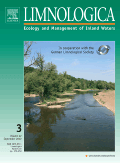
LIMNOLOGICA
metrics 2024
Innovating Research for Sustainable Water Management
Introduction
LIMNOLOGICA is a prestigious academic journal dedicated to the field of aquatic sciences, published by Elsevier GmbH, a leading global publisher known for its commitment to disseminating high-quality research. With an ISSN of 0075-9511 and an E-ISSN of 1873-5851, the journal has established itself as a vital source of scholarly articles, reviews, and case studies since its inception in 1974. Operating from its base in Munich, Germany, LIMNOLOGICA provides a forum for researchers and professionals to explore contemporary issues in limnology, ensuring important contributions to the understanding of freshwater ecosystems. Recognized in the 2023 rankings, the journal boasts a respectable Q2 quartile in Aquatic Science, ranking #98 out of 247 in Scopus, placing it in the 60th percentile among its peers. While currently not an open-access journal, it continues to attract a wide readership by providing insights into ecological processes, conservation strategies, and the impacts of anthropogenic changes on freshwater environments. This makes LIMNOLOGICA an essential resource for anyone engaged in aquatic research, conservation efforts, and environmental policy development.
Metrics 2024
 0.54
0.54 2.00
2.00 2.20
2.20 57
57Metrics History
Rank 2024
Scopus
IF (Web Of Science)
JCI (Web Of Science)
Quartile History
Similar Journals
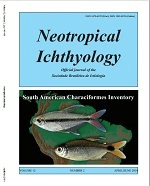
Neotropical Ichthyology
Advancing ichthyological knowledge in the heart of the Neotropics.Neotropical Ichthyology is a prestigious open-access journal published by the SOC BRASILEIRA ICTIOLOGIA, dedicated to advancing the field of ichthyology within the Neotropical region. Since its inception in 2003, the journal has provided a vital platform for researchers, professionals, and students to disseminate significant findings related to fish biology, ecology, and conservation. With an impact factor that is reflected in its impressive Q1 ranking in Animal Science and Zoology and Q2 rankings in both Aquatic Science and Ecology, Evolution, Behavior and Systematics, it stands as a leading resource for cutting-edge research. Located in Brazil, at the UNIV SAO PAULO, the journal not only contributes to scientific knowledge but also fosters collaboration among ichthyologists dedicated to the rich aquatic biodiversity of the Neotropical region, ensuring that critical insights into fish species, habitats, and conservation strategies are accessible to a global audience.

INTERNATIONAL REVIEW OF HYDROBIOLOGY
Exploring the Depths of Ecology and EvolutionINTERNATIONAL REVIEW OF HYDROBIOLOGY is a prestigious academic journal dedicated to the dynamic fields of Aquatic Science and Ecology, Evolution, Behavior, and Systematics. Published by a reputable German publisher, this open-access journal ensures that groundbreaking research is readily available to a global audience, fostering collaboration and innovation within the scientific community. With an impressive impact factor and classification within the Q2 category of both Aquatic Science and Ecology, it ranks notably high on Scopus, standing at 211 out of 721 in Ecology and 84 out of 247 in Aquatic Science as of 2023. Covering a broad scope from fundamental hydrobiological research to applied ecological studies, the journal plays a crucial role in advancing knowledge and addressing contemporary environmental challenges. Researchers, professionals, and students will find INTERNATIONAL REVIEW OF HYDROBIOLOGY to be an essential resource for informing their own work and contributing to the global dialogue on aquatic systems and their conservation.
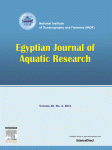
Egyptian Journal of Aquatic Research
Connecting researchers to elevate aquatic understanding.Welcome to the Egyptian Journal of Aquatic Research, a premier peer-reviewed academic journal published by ELSEVIER, dedicated to advancing the field of aquatic sciences. With a robust impact factor and recognition as a Q1 journal in key categories such as Aquatic Science and Ecology, this open access journal has established itself as a vital platform for disseminating high-quality research since its inception in 2012. The journal aims to provide comprehensive coverage of topics including ecology, evolutionary biology, and water science, making it a crucial resource for researchers, professionals, and students engaged in these dynamic fields. With Scopus rankings placing it in the top echelons of various categories, the Egyptian Journal of Aquatic Research fosters innovation, collaboration, and knowledge dissemination on a global scale, making it an indispensable asset for anyone invested in understanding and preserving aquatic systems.
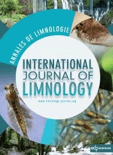
ANNALES DE LIMNOLOGIE-INTERNATIONAL JOURNAL OF LIMNOLOGY
Exploring the Depths of Freshwater ScienceANNALES DE LIMNOLOGIE-INTERNATIONAL JOURNAL OF LIMNOLOGY is a distinguished scientific journal dedicated to the field of limnology, focusing on freshwater ecosystems and their ecological dynamics. Published by EDP SCIENCES S A, this journal has been a vital resource for researchers and professionals since 1965, fostering a deep understanding of aquatic environments through quality research and scholarly discussions. The journal was indexed in Scopus, where it ranked in the 37th percentile within the Agricultural and Biological Sciences category, emphasizing its contribution to aquatic science. While its coverage has been discontinued in Scopus since 2021, the journal continues to engage its readership with critical insights and reviews in limnology. ANNALES DE LIMNOLOGIE promotes open access to facilitate the dissemination of valuable knowledge, making it an essential platform for students, researchers, and professionals who strive to advance our understanding of freshwater systems.
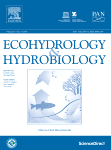
ECOHYDROLOGY & HYDROBIOLOGY
Elevating knowledge for a sustainable future in aquatic environments.ECOHYDROLOGY & HYDROBIOLOGY, published by the European Regional Centre Ecohydrology Polish Academy of Sciences, is a leading journal in the field of Aquatic Sciences, recognized for its impactful contributions with a 2023 Scopus ranking placing it in the top 20% of its category. Established in 2001 and converging scholarly insight until 2024, this journal aims to advance knowledge on the interactions between hydrological cycles and biological communities, providing a platform for innovative research that addresses critical environmental challenges. With a Q1 quartile classification, it is an essential resource for researchers, professionals, and students dedicated to exploring sustainable aquatic ecosystems. Although it follows a traditional subscription model, the journal maintains a commitment to disseminating high-quality research that informs policy and practice in the field. Located in Portugal and operating out of Lodz, the journal invites a diverse global readership to engage with its comprehensive range of articles and studies.
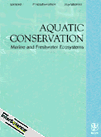
AQUATIC CONSERVATION-MARINE AND FRESHWATER ECOSYSTEMS
Advancing aquatic knowledge for a sustainable future.AQUATIC CONSERVATION-MARINE AND FRESHWATER ECOSYSTEMS, published by WILEY, is a premier international journal dedicated to advancing the understanding of aquatic ecosystems and their conservation. With an impact factor reflecting its significant influence and a distinguished position in the Q1 quartile across key categories such as Aquatic Science, Ecology, and Nature and Landscape Conservation, this journal serves as an essential resource for researchers and professionals engaged in the study and protection of marine and freshwater environments. Covering a broad array of topics, from ecosystem management to conservation strategies, the journal encourages the dissemination of innovative research and interdisciplinary perspectives. Although it is not an open-access publication, this journal is esteemed for its rigorous peer-review process, facilitating a platform where vital research influences policy and practice in the aquatic sciences. Established in 1991, AQUATIC CONSERVATION continues to be a cornerstone in the academic exploration and safeguarding of aquatic ecosystems through to its converged years of 2024 and beyond, providing a critical lens for the future of environmental sustainability.
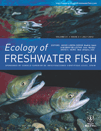
ECOLOGY OF FRESHWATER FISH
Unveiling the intricacies of freshwater habitats.ECOLOGY OF FRESHWATER FISH is a premier academic journal dedicated to advancing the understanding of freshwater fish ecology, published by Wiley in Denmark. With an ISSN of 0906-6691 and an E-ISSN of 1600-0633, the journal has been a critical platform for researchers since its inception in 1992, and will continue through 2024. It holds an impressive Q2 ranking in multiple categories including Aquatic Science and Ecology according to the latest quartiles, reflecting its significance and impact in these fields. The journal is well-regarded with Scopus rankings placing it in the top percentiles for ecology-related disciplines, showcasing its contributions to the understanding of aquatic ecosystems. Although it does not offer open access, the journal is highly valued for its rigorous peer-review process and its commitment to publishing original research that informs policy and conservation efforts. By bridging the gap between theory and practice, ECOLOGY OF FRESHWATER FISH remains a vital resource for students, professionals, and researchers engaged in the study of freshwater environments.

OCEANOLOGICAL AND HYDROBIOLOGICAL STUDIES
Advancing our understanding of marine ecosystems.OCEANOLOGICAL AND HYDROBIOLOGICAL STUDIES, published by WALTER DE GRUYTER GMBH, serves as a crucial platform for the dissemination and discussion of pivotal research in the field of oceanography and hydrobiology. With an ISSN of 1730-413X and an E-ISSN of 1897-3191, this journal highlights interdisciplinary studies that address pressing ecological issues impacting marine environments. Although it currently ranks in the Q4 category of oceanography journals and holds a Scopus rank of 96 out of 145, its commitment to publishing high-quality research positions it as a valuable resource for researchers, professionals, and students alike. As it converges into 2024, OCEANOLOGICAL AND HYDROBIOLOGICAL STUDIES remains dedicated to advancing our understanding of aquatic systems, contributing significantly to the scientific community's efforts in ocean conservation and management.
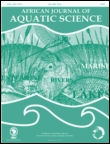
AFRICAN JOURNAL OF AQUATIC SCIENCE
Connecting researchers to the pulse of aquatic ecosystems.AFRICAN JOURNAL OF AQUATIC SCIENCE, published by TAYLOR & FRANCIS LTD, is a premier scholarly journal dedicated to the field of aquatic science, ecology, and environmental management, playing a crucial role in advancing research and knowledge in these vital areas. With an impressive Q2 ranking in both Aquatic Science and Ecology, Evolution, Behavior and Systematics, the journal seeks to publish high-quality research encompassing a wide range of topics related to freshwater and marine ecosystems, including biodiversity, conservation strategies, and the impacts of climate change. Featuring a rich history of publication from 2000 to 2024, the journal not only embraces rigorous peer review but also aims to foster collaboration and dialogue among researchers, practitioners, and students interested in aquatic environments. Readers will find that the journal’s commitment to impactful scientific communication is reflected in its notable rankings within the Scopus database, making it an essential resource for those engaged in aquatic research and management.
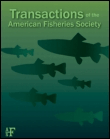
TRANSACTIONS OF THE AMERICAN FISHERIES SOCIETY
Exploring the depths of aquatic ecology and management.TRANSACTIONS OF THE AMERICAN FISHERIES SOCIETY, published by Wiley, is a leading journal dedicated to the field of fisheries science and aquatic ecology, with a rich history dating back to its inception in 1872. As an esteemed publication within the realms of Aquatic Science and Ecology, Evolution, Behavior, and Systematics, it currently holds a Q2 quartile ranking, demonstrating its significance and influence in these disciplines. The journal is not open access, which enables a curated peer-review process while ensuring high-quality research dissemination. The journal serves as a vital platform for scholars and practitioners alike, providing essential insights into the management and conservation of aquatic resources. Its commitment to addressing contemporary challenges faced in fisheries and aquatic environments makes it indispensable for researchers, professionals, and students seeking to contribute to this dynamic field.